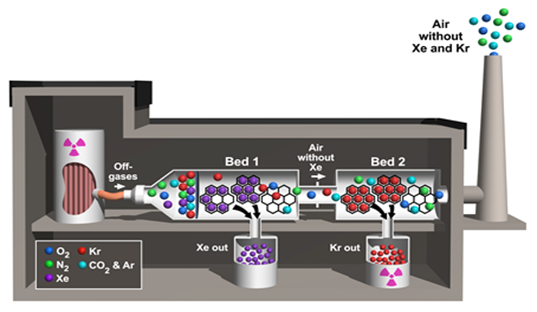Off-Gas and Waste Form Technologies
During the processing of used fuel, volatile radionuclides need to be captured and managed so that facility discharges do not exceed regulatory limits during normal operation. The volatile radionuclides of concern include iodine. The chemical and physical form, impurity concentrations, and specific handling requirements of the volatile waste streams are directly determined by the capture methods deployed.
Areas of Focus
- Develop materials and processes for capture of I, 3H, Kr and C that can be implemented across likely used fuel treatment processes
- Develop fundamental understanding of the generation, distribution, capture, and immobilization of radionuclides from used fuel treatment processes
- Develop the associated waste forms and processes
- Design and demonstrate the effectiveness of integrated off-gas treatment systems

Waste Form Development
Waste treatment, storage, transportation, and disposal are a large fraction of the cost of the fuel cycle facilities. Waste management technologies development and planning must go hand-in-hand with the development of advanced separations and fuel supply technologies to provide durable and economical waste forms for the diverse oxide, metallic, and gaseous waste streams generated during fuel recycling and fabrication operations. Activities include optimizing the production, waste loading, and durability regulatory acceptability, and long-term performance in disposal systems.
Areas of Activity
- Develop and demonstrate advanced waste management technologies with greatly improved cost and properties
- Develop a fundamental and practical understanding of the factors affecting performance of advanced waste forms over geologic time-scales to support their qualification for disposal
- Develop the associated waste forms and processes
- Develop suitable waste forms and processes capable of immobilizing radioiodine with characteristics that limit the release of radioiodine to levels consistent with a potential repository environment